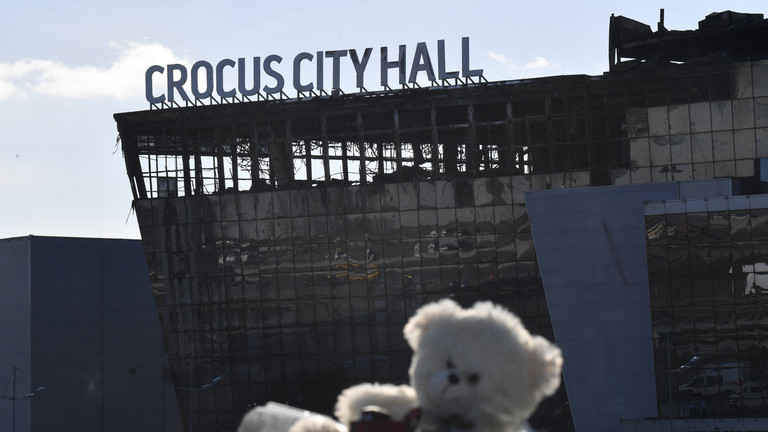
ISIS claiming responsibility for the massacre doesn’t end matters, while Washington and Kiev’s reactions raise even more doubts.
It is baffling why the powers that be, instead of trying to prevent the conflict in Ukraine from going out of control, seem actually bent on intensifying it. The horrific terror attack in Moscow at the Crocus City Hall that has resulted in 139 dead and 182 wounded has added fuel to the fire. Russia is bound to react to this grave provocation.
The US took military action against Afghanistan after the September 11, 2001 terrorist attacks on its soil, even though the terrorists were not Afghan. In 2003, President Bush attacked Iraq on the grounds that it had terrorist ties, which was not the case. Russia would have these precedents in mind while considering its response to the terrible terror attack it has suffered.
President Putin has stated several times in the past, and once again in his recent interview with Tucker Carlson, that the CIA was involved in the Islamic insurgency in the Caucasus. As far back as 2015, he said in an interview with Rossiya-1 television channel host Vladimir Solovyov for a documentary film ‘President,’ commenting on The Second Chechen War, that the West was trying to tear Russia apart by supporting terrorists, and that North Caucasus elements were in direct contact with representatives of US intelligence in Azerbaijan.
When the Soviet Union invaded Afghanistan, the US, along with Saudi Arabia, mobilised Islamic extremists to launch a jihad from Pakistani soil against Soviet forces. Central Asia, with its Muslim population, was considered the soft underbelly of the Soviet Union and the strategy was to de-stabilise it by provoking a religious conflict in the country. While Central Asian countries are today independent, they can still be used as springboards to strike at Russia.
Moscow is watchful about this possibility. Russia has a large Muslim population and preserving religious harmony in the country would be crucial for internal stability.
President Putin in his address to the nation after the terror attack has pointed a finger at Ukraine. The terrorists, he said, were heading towards the Ukrainian border and there were arrangements to take them across it.
In his second address on Monday night, he went a step further, saying the attack may be only a link in a whole series of attempts by those who have been fighting Russia since 2014, “using the neo-Nazi Kiev regime as their hand.” This is a grave charge, with very serious implications.
The US is trying to deflect attention away from any Ukrainian involvement. Immediately after the terrorist mayhem in Moscow, the White House spokesperson stated that Ukraine was not involved. This is unusual. Even before any investigation has taken place the US seems to have reached a conclusion about Ukraine’s non-involvement. For the spokesperson to affirm this so categorically would suggest that the US agencies would be aware of who is involved.
The US, and the UK, had in early March warned their citizens in Russia to avoid mass gatherings, concerts etc. Very often countries do issue such advisories as a precaution because they have got a whiff of some terrorist attack being planned. But, for the White House spokesperson to immediately after the attack in Moscow rule out Ukrainian involvement raises some questions. It is not clear why Ukrainian extremist elements intending to target Moscow would share their plans with the US.
On the issue of terrorism there is consensus in so many forums, be it the UN, the G7, the G20, BRICS and SCO, on collective action by the international community to combat terrorism. It is repeated in many multilateral documents that no cause justifies a recourse to terrorism.
In this light, whatever the current differences between the US and Russia, if the US had hard information about the planned terrorist attack in Moscow one could argue that they should have alerted Moscow more precisely. More so to stave off the real possibility of Russia holding Ukraine responsible for this act. The Russians have long accused Ukrainian nationalists of terrorising the Russian ethnic civilian population in Donbass and also cite the case of pro-Russians set on fire in a building in Odessa by Ukrainian nationalists in the early days of the conflict, in May 2014.
More recently, Moscow has accused Kiev of numerous terrorist attacks, including two bombings of the Crimean Bridge, in which civilians were killed, as well as the targeted assassinations of Russian public figures, including journalist Darya Dugina, the daughter of prominent Russian philosopher Aleksandr Dugin in August 202, and military blogger Vladlen Tatarsky. Last year, the Washington Post reported that Ukrainian security agencies “have carried out dozens of assassinations against Russian officials in occupied territories, alleged Ukrainian collaborators, military officers behind the front lines and prominent war supporters deep inside Russia.”
Many are questioning the narrative of the West, led by the US, that ISIS is responsible for the Moscow attack. In their view the political intention is to deflect attention away from any Ukrainian complicity because such a massive attack against innocent civilians could negatively affect world opinion, especially in the Global South, on Ukraine as a victim of “unprovoked” Russian aggression.
No doubt Russia has acted against Islamic State in Syria and remnants of ISIS could have planned this attack. However, its timing raises some doubts. It could have been planned just before the presidential elections in order to seriously disturb them. But then, it could have been reasoned that in that case the public would line up more solidly behind Putin. Committing this monstrosity after the presidential election would, however, “spoil Putin’s party,” as it were. And so the choice was made.
It is widely believed that the West has used Islamic extremists in Syria to fight the Assad government. President Putin, while targeting ISIS in Syria, has voiced concern that these elements could present a potential terrorist threat to Russia, with Russia’s experience of the conflict in the Northern Caucusus in mind, when the sympathy of the West lay with the insurgents.
It would not be difficult for intelligence agencies to manipulate Islamic extremists from behind the scenes, organise funds and arms for them, and even have them claim responsibility. This would be standard practice to ensure deniability. The fact that ISIS has claimed responsibility for the Crocus City Hall attack does not definitively close the matter.
If it was ISIS that was behind this monstrous act of terror, the four suspects arrested and interrogated do not fit into the profile of ideologically committed Islamic extremists. They do not come across as persons ready for martyrdom for a cause they deeply believe in. Rather, they come across as small-time mercenaries, ready to do a job, however heinous, for some money.
The narrative propagated by some in the West, and in Ukraine in particular, that this is a false-flag operation carried out by Russian agencies in order to create grounds for more mobilisation of troops and an all-out assault on Ukraine, is going too far.
Russia does not need the excuse of a major terror attack to step up its operations against Ukraine. With President Macron ready to send French troops into Ukraine – 2,000 soldiers to begin with, according to the Russian intelligence chief Naryshkin – and General Pierre Schill of France expressing French readiness to show “strength” in an Op-Ed in Le Monde, the Baltic states egging for NATO intervention in Ukraine, the move to supply F16s to Ukraine, the clear warning by Russia that French/NATO troops would be legitimate targets, are enough reasons for a worsening military conflict in Ukraine.

Paper ” Le Monde” has been taken over recently by jewish billionaire Daniel Kretinsky from Tzeck Republic.
Strange that a tzeck citizen wants some influence in France, subventionned by state. Because most main stream media in France get state subventions
The West created ISIS so yes, 100%.